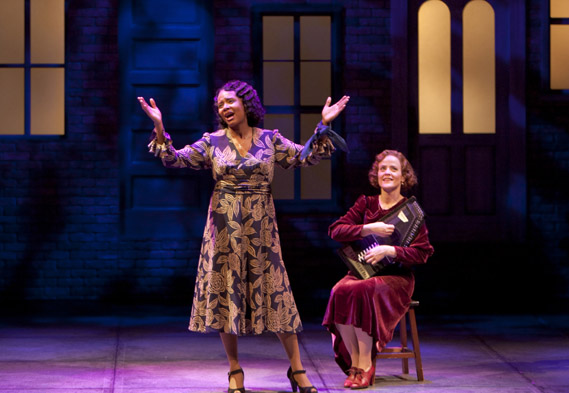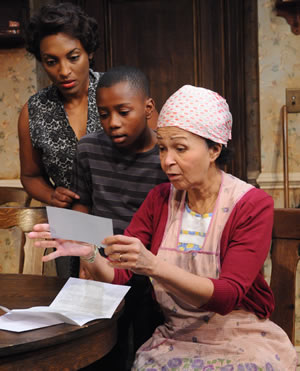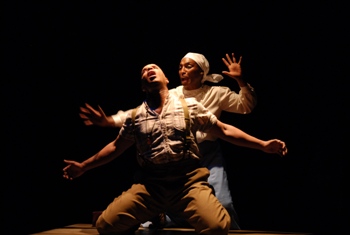|
Jacqueline Lawton: What was the first play that you ever directed? What did you learn from that experience that remains with you today?
Jennifer Nelson: The first thing I directed that was not part of Living Stage Theatre was a devised piece based using my and my sister’s poetry. Called “Mama, I Remember,” (the name of one of my sister’s books) it was an interesting amalgam of words and music. I think it was pretty good but I was so self conscious and nervous about putting my own work in public, that my anxiety kind of kept me from enjoying it fully. Over the years, I have developed a thicker skin but I am still my own worst critic. JL: Why did you decide to get into theatre? Was there someone or a particular show that inspired you? JN: After he got out of the Air force, my father was involved in theatre. That was when I was an adolescent in Sacramento, California. The first plays I can remember seeing were productions he was in. He was teaching school daytimes and running to one rehearsal or another in the evenings. I was astounded at how funny he could be in one play such as Cyrano then heartbreaking in another like Othello. His dream was to get into the professional theatre. JL: What kind of work do you do to pay the bills? How do you balance this work with your work as a director? JN: For almost 4 years I have been on staff at Ford’s Theatre. It’s proven to be a pretty good match as I can indulge in my interest in history as well as be part of the artistic staff. I have directed three productions here and I am able to continue my freelance directing life. JL: In DC, we have the Capital Fringe Festival, the Intersections Festival, the Source Festival, the Kennedy Center's Page-to-Stage Festival, the Black Theater Festival, and the Hip Hop Theatre Festival. We also have the Mead Lab at Flashpoint Theater Lab Program. Have you participated in any of these? If so, can you speak about your experience? JN: I’ve been part of a bunch of festivals. When still with African Continuum, I actually produced the first hip hop theatre festival in DC. It was at the Kennedy Center in the old AFI Theatre (which is now the Youth and Family Theatre). I directed one of the two full productions: The Hip Hop Nightmares of Jujube Brown (which had had a very successful run in the Old Vat Room at Arena) featuring Psalmayene 24 and Toni Blackman. We later took that show to the New York Hip Hop Theatre Festival and the National Black Theatre Festival in Winston-Salem. In retrospect I think we were ahead of our time in putting hip hop on stage as legit theatre. JL: How many plays have you directed in the DC area? How many of them were written by women? By playwrights of color? How conscious are you selecting plays by women or people of color when deciding your season? JN: I have directed approximately 45 productions: 23 by women (including a couple of things I also wrote) and 38 by playwrights of color. I am very, very conscious of the source of plays I work on. When I was Artistic Director of African Continuum Theatre selecting works by and about African Americans was part of my mission and thus was a major factor in choosing plays. Now that I get more “work for hire” I have less control over what material I am offered. I would actually like to believe I have credibility as a good director; not just a good black director. JL: How do you feel the DC theatre community has addressed the issues of race and gender parity? How has this particular issue impacted you and your ability to work? JN: In terms of Artistic Directors Washington has been ahead of the national pack insofar as gender. In all other areas of race and gender parity we’re better than some places, not as far along as others. If we measure by the general demographics of this area, we’re not doing that well. There’s no doubt in my mind that my identity as an African American has impact on my being considered for directing gigs…maybe it’s not a conscious thing but there it is. Artistic Directors naturally hire within their personal and professional comfort zones; that generally means they hire people they know or who are recommended by people they know. If their circle of colleagues is not diverse, then it stands to reason that their choices will be less than diverse. JL: If you could be direct at any theatre in DC, which would it be and why? JN: I would love to do something adventurous at Round House. It would be kind of a return since I did a couple of shows there in my early career when Jerry Whiddon was still AD. And, yes, I’ll admit that I’d like to work at Arena: it was my first theatre home. I think little scraps of my DNA are still embedded there. JL: DC audiences are ... JN: SMART! ADVENTUROUS! CURIOUS! JL: DC actors and designers are ... JN: A wonderful collection of talent, skill, creativity. JL: DC playwrights are .. JN: Plentiful. JL: DC critics are ... JN: I won’t attempt to categorize them. JL: What advice do you have for an up and coming DC based director or a director who has just moved to D.C.? JN: Find a place to make the work that makes your heart sing even if you don’t make a dime or get reviewed in the papers. My mentor Robert Alexander of Living Stage used to say, “It’s not any harder to make your own theatre than to get a job in somebody’s else’s.” True. JL: What's next for you as a director? Where can we keep up with your work? JN: Nine Circles by my dear friend Bill Cain at Forum Theatre in January. It’s about a young veteran’s heartbreaking journey to hell. Top Dog/Under Dog by Susan-Lori Parks at Everyman Theatre in Baltimore in April/May.
1 Comment
Karin Abromaitis
11/26/2012 09:05:01 am
Jennifer is a warm and generous director. Everyone who works with her always wants to work with her again. She has a way of bringing people and stories together in ways that are so visceral and immediate-cut to the bone or belly laughs. Fantastic either way!
Reply
Your comment will be posted after it is approved.
Leave a Reply. |
My BlogI'm a playwright, dramaturg, and teaching artist. It is here where you'll find my queries and musings on life, theater and the world. My posts advocate for diversity, inclusion, and equity in the American Theatre and updates on my own work. Please enjoy!
Categories
All
Archives
June 2020
Reading List
|



